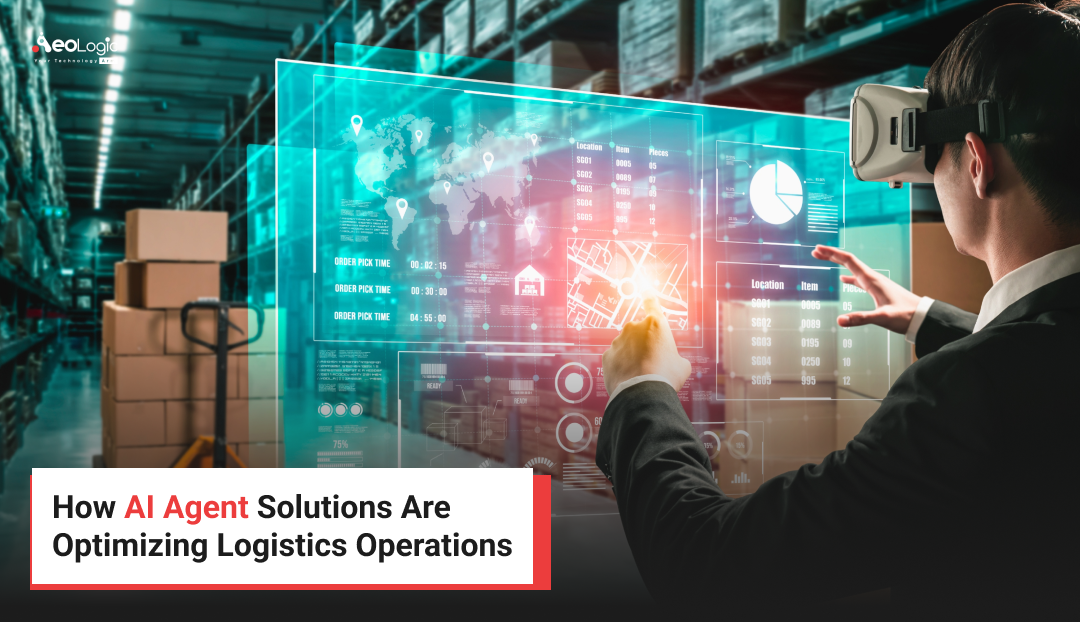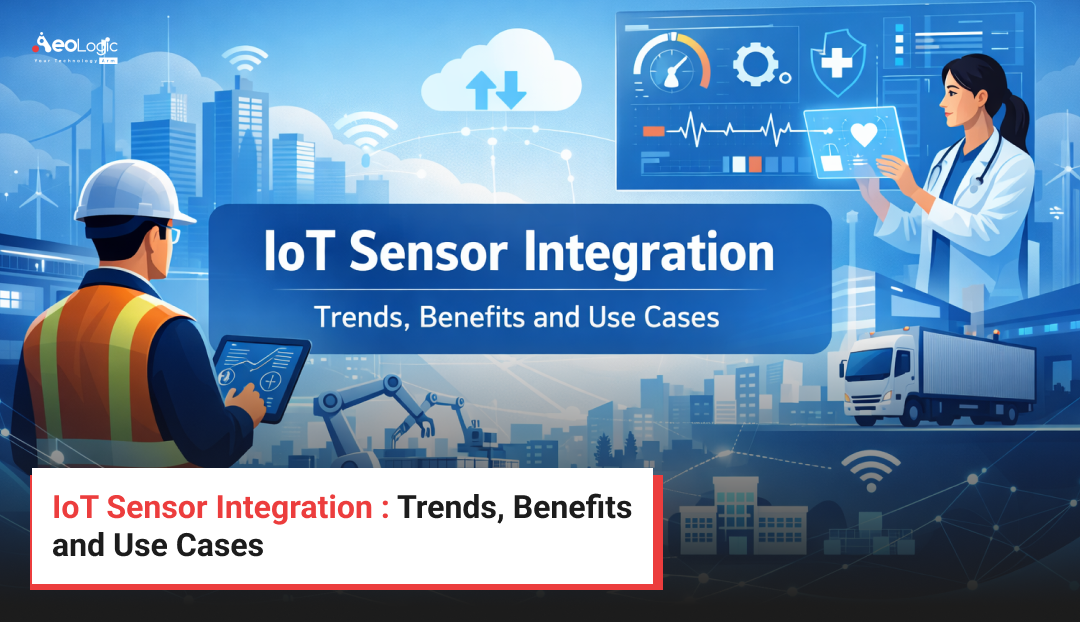The logistics industry is at a pivotal moment, driven by the transformative power of AI agent solutions for logistics. These new age systems are transforming the supply chain activities including the inventory and last mile delivery. With global logistics spending projected to reach $10.6 trillion by 2027, businesses are turning to AI logistics management to boost efficiency, reduce costs, and meet rising customer expectations. This blog dives deep into how intelligent logistics platforms are reshaping the industry, addressing challenges, delivering measurable benefits, and paving the way for a smarter future.
The Significance of AI Agent Solution in Logistics
Logistics industry is under fierce competition to provide more unexceptionably fast, cost effective and more efficiently services. The old systems which are manual based and static lack ability to keep up with the current needs. These issues include volatility in demand, cost of fuel and complicated international supply chain, which need to be solved via innovation. AI agent solutions for logistics offer automation, predictive insights, and real-time adaptability, enabling companies to overcome these hurdles.
According to a 2024 report by McKinsey & Company, the companies that have integrated AI in their logistic processes are able to get their cost lower by 15-20 percent and even faster delivery by up to 30 percent. By leveraging intelligent logistics platforms, businesses can streamline operations, enhance customer satisfaction, and stay competitive in a dynamic market.
The Major Issues on Traditional Logistics Operations
To understand the impact of AI logistics management, let’s first explore the core challenges in traditional logistics:
- Expensive Operation: Tracking of inventory, route planning and customer support involve manual processes, thereby increasing labor and petrol costs.
- Lack of Proper Routing: The problem with the static routing systems is that it does not match the real time inputs such as the traffic, weather, or urgent delivery requirement.
- Inventory Mismanagement: Stockouts or overstocking lead to revenue loss, wastage of resources and Square dancing of customers.
- Poor Real-Time visibility: absence of visibility at the supply chain slows down proactive decision-making.
- Regulatory Compliance Risks: Compliance monitoring is done manually and thus it poses a risk to penalties and delays in the operations.
- Customer Expectations: The current customers are now expecting a quicker delivery and real-time updation of the deliveries of products which is unattainable using the old systems.
These challenges underscore the need for AI agent solutions for logistics to modernize and optimize operations.
The AI Agent Solutions that Changing Logistics
AI agent solutions for logistics harness machine learning, predictive analytics, natural language processing, and automation to address these challenges. The following are the best use cases that can bring real changes in the logistic operations.
Demand Forecasting Predictive Analytics
Predictive analytics with the help of AI are used to study historical data and trends of the market and external factors (e.g., weather, holidays, or economic changes) to make forecasting of demand with high accuracy. This helps in curbing over ordering and out of stocks and streamlines as far as stock is concerned. As an illustration, DHL experienced an increase in inventory accuracy by 20 per cent due to the implementation of AI-based forecasting solutions. Companies are able to cut down wastages and increase cash flow using production to forecasting demands.
Image: Predictive Analytics Dashboard
Caption: AI-drivn predactive analytics dashbords provde real-times insigehts for invantory optimzation.
Dynamic Route Optimization
Intelligent logistics platforms use AI to optimize delivery routes in real time, factoring in variables like traffic, weather, fuel costs, and delivery windows. This cuts down on the delivery time and amount of fuel used which has a direct effect on the bottom line. In 2023, a Gartner report concluded that AI-optimized routing reduced delivery expenses by a rate of between 10-15 percent among logistics providers. As an example, the ORION system used by UPS saves it millions of dollars each year in improving the routes of its deliveries.
Caption: Route optimization with the help of AI guarantees quicker delivery at a reduced fuel price.
Warehouse Automation and Robotics
Robotic systems in disorderly warehouses are regulated using AI agents who are designed to automate the process of picking, packing, sorting, and managing inventories. These systems have the advantage of being active all day, every day and even during the night saving costs of labor and human error.
The AI-based warehouses at Amazon can complete orders 30 % faster than the conventional systems and receive accuracy with millions of packages daily. Cobots Collaborative robots (cobots) supplement human personnel, but they can increase productivity without a system overhaul, one of the reasons that has made them so popular.
Real-Time Supply Chain Visibility(RTSCV)
AI logistics management platforms integrate IoT sensors, GPS, and AI analytics to provide end-to-end visibility into supply chain operations. Businesses are also able to trace movement of shipment, keep an eye on the stocks and identify hindrance in real-time. It would facilitate deciding ahead of time especially in redirecting shipments to prevent delays. Forrester recorded that 73 percent of logistics companies that used AI-powered visibility enhanced the delivery rates by 20 percent in 2024.
Figure 1: AI-driven real-time dashboard supply chains benefit with transparency in operation.
Artificial intelligence-Based Client Support
Virtual assistants and AI chatbots are to answer customer questions regarding shipment status, delivery times and returns. These intelligent logistics platforms operate 24/7, reducing wait times and freeing human agents for complex tasks. According to a Forbes report, 68 percent of logistics firms that used AI chatbots recorded an increase in customer satisfaction levels. Case in point, FedEx virtual assistant is used to resolve 80 per cent of customer inquiries without human interaction.
Fraud Detection and Compliance Monitoring
AI agents study such data as transactions and shipment and identify fraudulent activities, including unauthorized access or any strange patterns. They also guarantee that regulations such as custom demands or environment laws are adhered to. The AI-based compliance system that Maersk implements helped to reduce by 25 the regulatory fines, as it helped to identify any problem in real time and bring it in line with the international standards.
Intelligent Document Processing
Logistics requires loads of documentation such as invoices and customs declaration. NLP transforms the way a document is processed by the AI agent whereby key information is extracted and subsequently cutting down on significant reliance on human operators making errors. As an example, Kuehne+Nagel introduced the AI to handle shipping documents 40 percent faster, which increases the speed and efficiency of operations and the lack of delay at ports.
Image: Document Processing Interface
Caption: AI-powred documant processing streamlins logistecs paperwork with high acccuracy.
Fleet Management Predictive Maintenance
Sensors of IoT help AI agents to detect and monitor the health of the vehicle and forecast maintenance requirements prior to the vehicle breakdowns. This reduces idle time and increases life span of the fleet. The AI predictive maintenance within FedEx managed to save millions of dollars in repair costs and lowered the number of the vehicle downtime by 20 percent.
Benefits of AI Agent Solutions for Logistics
The adoption of AI agent solutions for logistics delivers a wide range of benefits, transforming every facet of the supply chain:
- Enhanced accuracy: The predictive analytics and real time monitoring reduce the errors in the inventory and demand forecasting.
- Improved Customer Satisfaction: 10-15% increase of customer satisfaction scores after faster response rates, real time tracking and personalized support.
- Scalability: Intelligent logistics platforms adapt to growing demand without significant infrastructure investments.
- Sustainability: the optimized routes AI feature and predictive maintenance decrease the usage of fuel and emission, contributing to environmental objectives.
Caption: Artificial intelligence-based logistics solutions enhance green logistics because they are efficient in fuel consumption.
Examples of AI used in Logistics Industry
Leading logistics providers are leveraging AI logistics management to gain a competitive edge. These are some of the outstanding examples:
- FedEx: It applies AI in predictive maintenance and during route optimization, which minimizes its operational costs by 10 percent (FedEx Newsroom).
- Walmart: Uses AI to manage inventory using AI to manage stock across the entire supply chain; cutting costs by millions of dollars every year (Walmart Investor Relations).
- Maersk: Leverages AI agent solutions for logistics to monitor shipping routes and predict delays, improving on-time delivery rates by 15% (Maersk Insights).
- XPO logistics: An example that leverages AI to automate the warehouse process accelerating 25 percent of order fulfillment (XPO Press Release).
These examples demonstrate how intelligent logistics platforms drive efficiency and innovation across the industry.
The Way Of Implementing AI Agent Solution To Logistics
Deploying AI agent solutions for logistics requires careful planning to ensure success. The following is a step by step guide to it:
- Establish Clear Objectives: Establish definite goals e.g. to cut on the cost of delivering, increase accuracy of inventory control, or even better customer service.
- Evaluate Current infrastructure: Determine its compatibility with systems already in place e.g. erp, warehouse management software or CRM.
- The right AI platform: You should select a scalable intelligent logistics platform depending on your requirements, then the IBM Watson, Google cloud AI or MicrosoftAzure AI.
- Assemble a talented Team: Recruit data scientists, AI /SW engineers and logistics experts to customize and maintain the system.
- Scale and Optimize: Scale up the use of AI in the entire operations and monitor performance with creation of KPIs to establish areas of need.
According to a report published by Accenture in 2024, enterprises whose approach to AI set-up is planned out performed ad-hoc based set-ups 2x in terms of ROI. This can be simplified by teaming up with individuals such as Aeologic Technologies.
A Success Measurement of AI in Logistics
To evaluate the impact of AI agent solutions for logistics, track these key performance indicators (KPIs):
- First-Contact Resolution (FCR): Evaluate the frequency of the queries getting addressed on the first contact.
- The Customer Satisfaction (CSAT): Track the feedback ratings to measure the results of customer experience improvement.
- First-Contact Resolution (FCR): Evaluate the frequency of the queries getting addressed on the first contact.
- The Customer Satisfaction (CSAT): Track the feedback ratings to measure the results of customer experience improvement.
- Delivery Time: Measure the decrease of the average time of delivery routes.
- Inventory Turnover Rate: Analyze the tendencies in the working efficiency of the management of the inventory.
- Eliminates measures of improvements in vehicle or system downtime because of predictive maintenance.
According to a PwC report, 82 percent of logistics firms using AI reported tangible improvements in the following KPIs within a half a year.
The Issue of Surmounting Obstacles in AI Implementation
While AI logistics management offers immense potential, implementation comes with challenges:
- Sigma Risks: The price of setup and integration may run $50,000-$200,000 on mid-sized businesses, Gartner says.
- Privacy: The protection of customers and shipment data is an issue that demands adequate security (encryption, data protection act (GDPR or CCPA) adherence, among others.
- Employee Resistance: The employees are likely to dread losing their jobs to automation. This can be made easy through training programs.
- Complexity of Integration: Legacy systems could need improvements in order to integrate with the current AI platforms.
- Data Quality Problems: AI depends on high quality data. Data of poor quality may give unreliable output.
These can be addressed by first getting on board small-scale pilots, solving new skills in employees, and enlisting reliable AI vendors such as Aeologic Technologies to integrate and maintain the solutions.
The Potential of the Emerging Technologies in AI Logistics
Beyond current applications, AI agent solutions for logistics are evolving with emerging technologies:
- Autonomous Vehicles: Self-driving drones and AI-based self-driving trucks are soon going to change last-mile delivery. The autonomous trucks at Waymo are already being tested in some of the areas.
- Blockchain integration: Blockchain integration with AI is secure and transparent, and allows tracking of shipment, therefore reducing the risk of fraud.
- Edge AI: Locally processing of IoT devices data allows accelerated decision-making in remote logistics activities.
- Augmented Reality (AR): AI-enabled AR can help the warehouse employee in picking and packing and make the process more accurate and faster.
The market in AI application in logistics is predicted to grow by 2030 to 20.7 billion dollars with an annual compound rate of growth of 29.6%. Firms which innovate such technologies first will be the pace setters.
Image: Autonomous Delivery Drone
Caption: Drone last-mile logistics will experience an overhaul with the use of AI
Case Study: Artificial Intllignce Transformation at DHL
DHL, a global logistics leader, provides a compelling example of AI logistics management in action. Adopting robotization of warehouses and utilising AI-powered predictive analytics, DHL accomplished:
- Inventory savings of 25 per cent with precise anticipation of demands.
- Delivery times are Increased by 15 per cent using AI-optimized routing.
- Robotic systems in twice as fast efficient in the warehouse.
These results, detailed in DHL’s 2024 Innovation Report, highlight the transformative potential of intelligent logistics platforms.
Final Take
AI agent solutions for logistics are redefining the industry by addressing inefficiencies, reducing costs, and enhancing customer experiences. From predictive analytics to autonomous vehicles, these intelligent logistics platforms empower businesses to thrive in a competitive, fast-paced market. By strategically deploying AI logistics management, companies can achieve significant ROI within months while preparing for future innovations like drone deliveries and blockchain integration.
Are you all set to change your logistic operations? Aeologic Technologies provides the latest advanced AI products with optimal design to your requests. We will be happy to help you build a smarter logistics!
FAQs
What are the benefits of AI agent solutions on cost of logistics?
AI supports performance such as routing, inventory management support or customer support which decreases the cost of labor and fuel cost of 15-20 percent, according to Deloitte.
Are there logistics systems that AI agent solutions can be integrated into?
Yes, most intelligent logistics platforms are designed for seamless integration with ERP, CRM, and warehouse management systems, ensuring minimal disruption.
What are the ways to enhance customer satisfaction in logistics with the help of AI solutions?
Chatbots driven by AI, real-time tracking, and tailored assistance enhance the meaning of response time and openness due to which the satisfaction rates increase by 10-15 percent (Forbes).
When will the AI in logistics reach ROI?
Accenture estimates that many companies can get measurable return on investment in 3-6 months with savings on costs and better efficiency.
Is there any danger in adopting AI in logistics?
Its disadvantages are the high implementation cost, privacy issues and difficulties in integration. These risks can be alleviated by piloting the projects and collaboration with professionals such as Aeologic.
What are the logistic activities that AI agents are capable of?
The AI agents coordinate and organize the demand prediction, route performance, customer service, fraudulent safety, and compliance surveillance, and processing of documents in the entirety of their process operations.
What role does Artificial Intelligence play in making logistics more sustainable?
Optimized routes based on AI and predictive maintenance increase fuel efficiency and decrease emissions, which fits in the environmental agenda and increases cost savings.

Currently, as a Senior Manager of Technology, I oversee a dynamic team, ensuring the delivery of high-quality software solutions that meet the evolving needs of our clients. A seasoned technology leader with over a decade of experience in the software development industry, I have been instrumental in driving the end-to-end software development lifecycle since my career inception in 2011.






